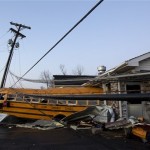 The story is told of three ministers having coffee together at a local café. I know, I know. This sounds like the beginning of a very bad joke: “A rabbi, preacher, and a priest walk into a bar…” But it’s not that one; stay with me.
The story is told of three ministers having coffee together at a local café. I know, I know. This sounds like the beginning of a very bad joke: “A rabbi, preacher, and a priest walk into a bar…” But it’s not that one; stay with me.
Three ministers were having coffee. The good parsons were discussing the most appropriate position to take while praying. How should we position ourselves in prayer, to get God’s greatest attention?
The first, probably a bit Presbyterian, said, “I find my prayers most effective when kneeling with my hands clasped together on my chest and my head bowed.”
The second, much more Pentecostal, favored a demonstrative pose. “I think the most effective prayer we can offer is when we have our entire bodies face down at the church altar, speaking in an unknown language.”
The third, of course, offered another alternative. Get three preachers together and there will be five opinions, I assure you. He said, “The most successful prayers are those offered while standing before the entire congregation with heads and hands lifted to heaven.”
Sitting close by was a telephone repairman. He had been listening to this ministerial exchange and could not resist adding his own opinion. He ambled over to their table and offered his own theological conclusion about prayer.
He said, “Reverends, pardon me for interrupting. I couldn’t help but overhear your conversation. No offense, but I have found that the most effective prayer I have ever prayed was while dangling by my boot strings from a bucket truck, sixty feet in the air.” The repairman paid his bill and left the trio, rightfully, speechless.
There’s nothing like a little desperation to sharpen one’s prayer life. Who really cares about folded hands, the standard sacred protocol, or reciting the King’s English when frantic for God to come to our rescue? Very few care at such times as these, I think.
Take, for instance, the Psalms. That old dusty volume in the middle of your Old Testament is the Hebrew prayer and praise book. When elated, the Jewish minstrels would write down celebratory songs that would rival Handel’s Messiah.
But when downcast, broken-hearted, and desperate, these same writers could pour out on paper the darkest, most melancholic cries for divine intervention you will ever read. Not even the songs popping and hissing out of a honky-tonk jukebox even come close.
When the Psalmists offered these songs and prayers of desperation, they included no instruction manual. So maybe we should just follow their lead: The Psalms are abrupt, impulsive, emotional, and often scalding to the ears. They come flaring out wherever the writer finds himself.
Shouting, whispering, fist-shaking, weeping, in the morning, late at night, over the mid-day meal, lying in bed, at worship in the temple: You name it, you’ll find it. The Psalms run the emotional and expressive range.
The common denominator in all of these is desperation for God to help. “My help comes from the Lord; the Lord is my Rock and my salvation. O Lord, do not turn a deaf ear to me for you are my only hope; the Lord is my shepherd. I shall not want.” These are beautifully familiar refrains that have comforted generations of readers.
Theologians assign an attribute to God known as “transcendence.” It means that God is above and over his creation; independent of the world. It sounds “God-like” enough, but I don’t know about all that.
But I do know that when pushed to our limit, when desperate, many of us reach for something outside ourselves. We reach for something greater, something other, something beyond our own existence and abilities.
What we reach for, we call God. How we reach, we call prayer. And when we reach, we do so most effectively, when we are desperate.
It really isn’t an issue of what pose you strike when you pray. Fall on your face. Stand on your feet. Spin on your head. Bow in the pew. Kneel at the rail. No matter. The prayers God seems to hear best are those prayers we offer when we are hanging by a thread.
When we have no place left to turn and all we can do is pray, it is then that all we can do is still a lot we can do. Tighten your boot straps, don’t stop praying, and hang on.

